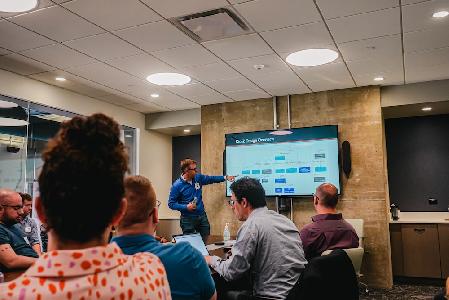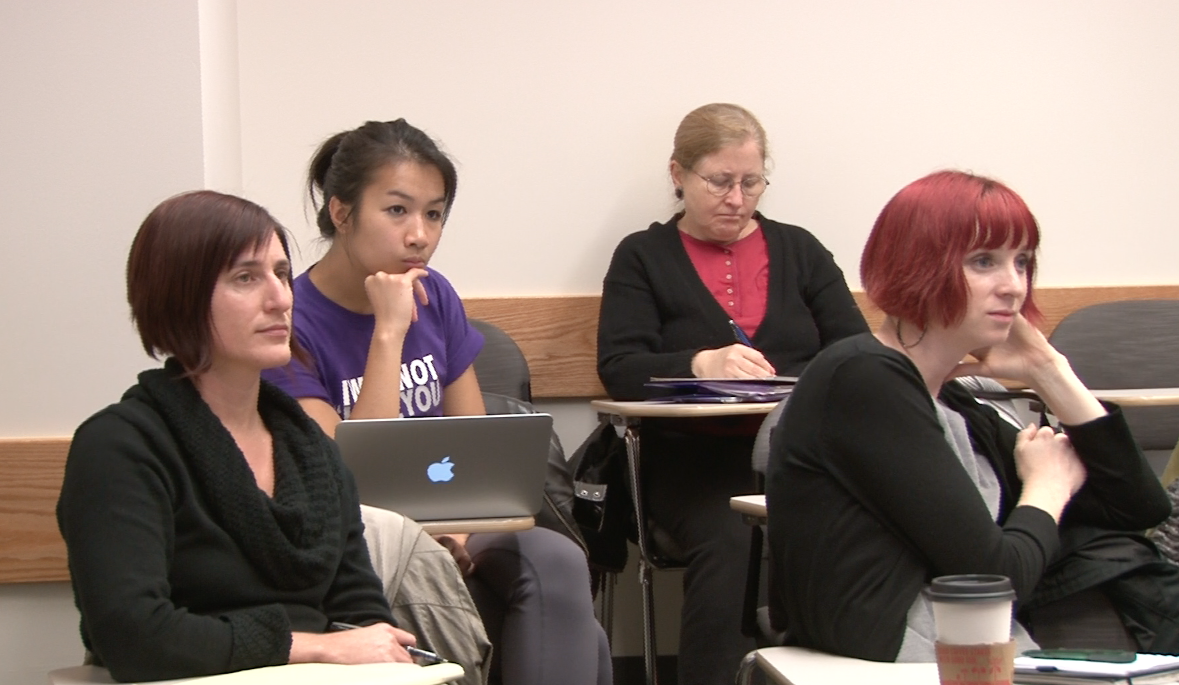In rallying concern about diversity in the IT field, there’s a careful balance some on the cause’s forefront aim to strike. Shock the wider world with statistical imbalance — just one in four of those working in the IT field are women — while remembering to highlight those already active in tech who don’t fit the white male consensus.
The shock is to motivate institutional change and the highlighting is to make sure those who are entering the IT field and happen to be female and/or of color aren’t discouraged or forgotten. So we must begin these conversations with the rather straightforward conclusion that neither a woman dev nor a coder of color is a unicorn. They can, indeed, be found in the wild.
The infrastructure for a more diverse talent pipeline is just in its infancy.
“But we still don’t have a herd,” said Tracey Welson-Rossman. She’s the chief marketing officer of Fort Washington-based enterprise mobile dev firm Chariot Solutions who has taken on the cause of gender parity in Philadelphia as a longtime IT executive, a cofounder of Philly Startup Leaders and, in recent years, as the director of TechGirlz, a STEM learning program for young girls.
Rossman is quick to mention how far behind the American IT sector is in having its ranks look more like the wider workforce. Most commonly, that’s a conversation about gender and race, with a sprinkling of thought about the income of families who might produce future tech talent.
At least that was the focus of a panel discussion held Tuesday at the 10th annual Emerging Technologies for the Enterprise conference at the Society Hill Sheraton. The conference, which draws 500 attendees, mostly from the mid-Atlantic, is heavily technical and, it turns out, largely, but not exclusively, attended by experienced white male technologists. Rossman is proud of annually packing the Sheraton with some of the region’s most serious dev talent but eager to push the agenda of diversity shortcomings.
This hourlong panel, attended by 20 and one out of dozens of conference sessions on topics like Angular development and Bluetooth mobile apps was a venue for that.
Both panelist and event organizer, Welson-Rossman was joined on the panel by Sylvester Mobley, the founder of the nonprofit after-school program Coded by Kids, Charles Eaton, who leads the philanthropic arm of CompTIA, and this reporter, who moderated the discussion.
For all the industry’s shortcomings on inclusivity, the panelists suggested that big changes are coming, led by a groundswell of organic rancor, for a few reasons:
- Product building: To vie for a global marketplace, you need team members who represent a wider array of backgrounds. That means a distributed workforce has value, but it also means gender and race (and age and family status) can help build better product. “A diversity of ideas really does not replace diversity of perspective,” said Eaton.
- Social Justice: With income inequality on the rise, no monied industry will escape identity politics. The IT sector is becoming more prominent in cities across the country, which is resulting in many industry watchers being increasingly mindful of how representative the IT sector looks relative to the wider workforce.
- Talent constraints: One of the more common complaints of hungry tech firms is that they can’t gobble up qualified talent fast enough. With women and people of color underrepresented in the IT sector, they are natural places to source recruits. (Our ebook Beyond Recruiting highlighted the creative ways firms are doing this.)
“Big cultural change only comes with a big economic incentive,” said Welson-Rossman.
That’s something echoed by Mobley, the former Marine and IT project manager turned nonprofit founder. In the West Philly native’s evolving pitch about his “Girl Scouts for software programming,” he’s getting more comfortable describing his weekly classes for 5-18-year-old Philadelphia public school students as a potential recruiting tool for IT firms.
“Businesses are going to care about kids in coding classes because the need for this talent isn’t going away soon and a better jobs market will only increase competition for those already in the field,” Mobley said.
We know what can work, we just have a scale problem.
Companies like JPMorgan Chase increasingly see themselves as technology firms first with a financial flavor, said Eaton, who leads industry data collection and mid-career IT workforce development programs. And while bootcamp coding schools like General Assembly are getting better at placing their graduates, and vocational colleges and four-year universities are trying to update their curriculum, these issues might also bring about a flourishing apprenticeship mindset.
Apprenticeship became outdated as it was seen as risky with a mobile workforce that would take their learning elsewhere. But with costly recruiting processes and concerns about the diversity of inputs, it could return, said Eaton.
“The infrastructure for a more diverse talent pipeline is just in its infancy,” said Welson-Rossman. And the very nature of introducing underserved communities to tech means it’s a particularly labor-intensive process — without being surrounded by family and friends to ask for help or normalize the behavior, taking an online coding course might be more challenging for a young person of color from a lower class.
There are programs that appear to be working. Women tech training group Girl Develop It and efforts like it are nationwide, and Step IT Up America is an example for women of color. TechGirlz and even just-a-year-old Coded by Kids appear to be habit forming for underrepresented future IT talent communities, said Eaton, and programs like theirs are popping up across the country.
But since many are nonprofits, a sector without clear processes and financial incentives for mergers and acquisitions, fewer big models are being exposed as quickly.
“We know what can work,” said Eaton. “We just have a scale problem.”
Join the conversation!
Find news, events, jobs and people who share your interests on Technical.ly's open community Slack

Philly daily roundup: Student-made college cost app; Central High is robotics world champ; Internet subsidy expiration looms

Philly daily roundup: Earth Day glossary; Gen AI's energy cost; Biotech incubator in Horsham

Philly daily roundup: Women's health startup wins pitch; $204M for internet access; 'GamingWalls' for sports venues


